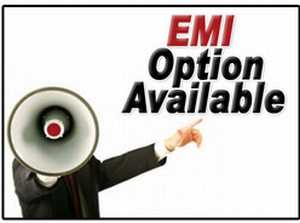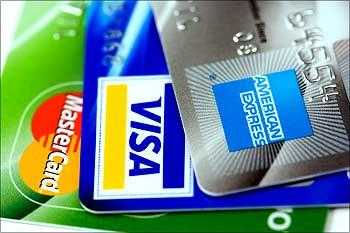
A lowdown on the strings attached to such credit card schemes and when you should and should not opt for them.
It's festival time and almost all shops and malls have lined up discount sales. Sensing an opportunity credit card companies have jumped in the fray with easy payment options, EMIs on your credit card payments, being one of them. Ramya Ramachandran gives you the lowdown on the strings attached to such credit card schemes.
From home appliances to the latest gizmos, this season sure is the perfect time to spend that extra bit by flashing and charging your credit card. But how do you handle your financial liquidity at such times? How do you settle credit card dues post all the shopping?
To handle such concerns, credit card issuers provide the option of the 'Equated Monthly Installment' on your credit card, giving you an extended period to settle dues. Sounds good? Read on to know what such schemes have to offer and the extra strings that need to be borne along with it.
Click NEXT for more

Credit card EMIs are a hassle free loan option
Credit card EMI is a convenient option to settle the outstanding amount in a fixed number of equal installments every month, very similar to the EMIs on your home loan or personal loan. It is a convenient option for those who are facing a temporary liquidity crunch to repay their credit card dues.
The facility of credit card EMIs may not be made available at all times by card issuers. Many a times only specific purchases from select merchants would be eligible for the EMI benefit. You would need to contact your card issuer for the details.
In general banks such as ICICI bank, HDFC Bank, Standard Chartered Bank, and Citibank etc... offer zero interest rate EMIs to low interest rate EMIS schemes ranging anywhere from 1.49% to 1.99% to their existing customers on request.
In comparison to personal loans, EMIs on credit cards come with minimal or no documentation.
Click NEXT for more

When should you opt for it?
EMIs on credit cards work out to be an ideal option for those facing a temporary cash inadequacy. It is a more cost effective option in comparison to non-repayment or late payment of dues.
Delay or non-repayment of outstanding amount before the due date attracts a late payment fee, a high interest rate of around 30 % (annualised) and also a bad credit report for the borrower. At such times opting for the EMI sure serves to be ideal.
Click NEXT for more

What to watch out for
1. The existing credit limit
During the period of your EMI, the pre-approved credit limit on your card is reduced to the extent of the outstanding amount. This amount is released as and when the EMI is billed and paid for. So remember you wouldn't be able to make purchases as per the approved limit on your card during the EMI time.
2. The extra costs
Banks levy additional charges for processing, documentation and prepayment. Even 0% interest schemes have such costs inbuilt in them.
Pre-closure charges range around 3% of the outstanding principal amount. Such charges sure do end up being quite an amount when annualised. So work out these costs along with the interest rate and compare it with other finance options.
3. Discounts at merchant outlets
Very often banks have tie ups with leading merchants and offer an EMI finance option only on certain products. If you are going in for something of this kind, the first thing to do is to talk to the cashier or representative of the outlet about the EMI programme. Other discount offers on the product generally cannot be clubbed with EMI schemes.
4. EMI defaults
Defaulting on EMI of credit cards should be strictly avoided as very high penalty charges are levied and the remaining balance may be converted into normal credit card dues.
Click NEXT for more

Reading the fine print
The credit card is a convenient tool and using it wisely is essential to avoid getting entangled in a world of debt. Thus, it is wise to read the fine print thoroughly to know the actual benefits entitled. Do keep in mind the following points.
1) At their discretion, card issuers may do away with the interest free periods, or even hike interest rates. Also, they reserve the right to revise the pre-payment charges, with prior notice of course, and such revised charges are binding on the borrower.
2) There will be a service tax applicable on processing fee, foreclosure fee and on the interest rate and is billed in the same statement.
A good EMI scheme may seem to be a convenience, yet, it is always better to avoid using it as the first option. Going overboard on a spend-splurge drive and then totally relying on EMI repayments should be avoided.
It is vital to distinguish between needs and wants and spending should be well within your income and reach. Remember there are no free lunches, and any expense and purchases has to be finally borne by you.